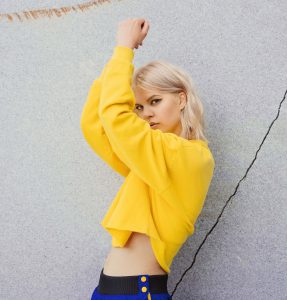 Music might as well have gone right past her and never come back. Eli Rose caught it on the fly, and built the world’s least solitary solo project. Her debut, eponymous album is also the first released by Maison Barclay Canada/Universal Musique Canada. Apparently, it’s possible to succeed on the first try.
Music might as well have gone right past her and never come back. Eli Rose caught it on the fly, and built the world’s least solitary solo project. Her debut, eponymous album is also the first released by Maison Barclay Canada/Universal Musique Canada. Apparently, it’s possible to succeed on the first try.
“This album exists in large part thanks to SOCAN,” she says, quite seriously. She was invited to the SOCAN Kenekt Song Camp at a time when she was exploring her options, and nothing pointed in the direction of a solo career. But it was there where she made the necessary acquaintances. “I didn’t think I’d make an album,” says Rose. “As a matter of fact, I was contemplating quitting music altogether. But I fell in love with urban music, and I understood that that’s what I wanted to do from then on.”
During the song camp, she was paired with June Nawakii (Nicki Minaj), Ruffsound (Dua Lipa, Loud), and Mike Clay (Clay and Friends) for a round of songwriting. “We wrote ‘Origami,’ and that got the ball rolling,” she says. “Ruffsound said that my voice, with French lyrics, on urban beats, is something no one’s heard before, so we decided that was the direction [in which] we’d go.” Banx & Ranx (Sean Paul, Ella Eyre), Billboard (Britney Spears, Shakira), Realmind (Allie X), and D R M S (Ariane Moffatt) also got on board with the project. “D R M S has always been a mentor to me,” says Rose. “He’s got a great ear for melodies.” But how did she manage to gather so many tasty ingredients for her soup? “Ruffsound played a very big role,” says the singer-songwriter. “He’s the padre of all producers. They’re all people I would never have had access to, were it not for SOCAN’s song camp.”
And even though the pop realm had served her well in the past, as half of the duo Eli et Papillon (Marc Papillon-Ferland), Rose felt a deep-seated desire to upend the rules. “It feels like we’ve been making the same kind of pop forever, in Québec,” she says. “If you wanted to make a pop record, you hired a record producer, some musicians, and you went in the studio to record your songs. But with Ruffsound, I discovered how you can start from scratch and make a totally relevant pop song with just a computer. Producers like him are changing the game.”
After releasing Colorythmie, the duo’s more “youthful” sophomore album, which did well at radio, Rose felt the urge to step away from the project. “I wanted to do something more mature, that was closer to who I really am,” she says. “Marc wanted to get into instrumental stuff and I wanted to make pop music. I needed to know if my voice had its place in this industry. I recorded a folk album, Les fantômes n’existent pas, that was never released. I then did an anglophone EP, Little Storm, that I wrote with Olivier Corbeil [of The Stills]. That was never released. I wrote for others alongside D R M S. I was kinda lost, but I never stopped writing.”
As she was growing increasingly distant from music, music came running back to her “like love at first sight,” as she puts it. “I met the right people at the right time and in the right place,” she says. “It made me want to forge ahead. YOLO!”
Maison Barclay Canada/Universal Musique Canada seeks to promote Francophone artists by giving itself the means to do it abroad. “A record label from Toronto that could very well do without Francophones, but has decided to do it anyway, now that’s encouraging!” says Rose. “Making it in France is a dream of mine, and I’ve had a taste of the French audience when we opened for Angèle and Jain. It’s a really beautiful territory.”
Eli Rose is fully aware that her life today is the result of a series of doors that she willfully stepped through. “When I did a feature on Rymz’s “Chrome,” I told myself I was more than one thing, and that is was OK to try new stuff,” remembers the artist, who doesn’t take anything for granted. She believes Québec isn’t quite ready to hear something other than folk and rap, but she’s willing to take on the challenge. “I believe intelligent Francophone pop music is possible,” she says. So do we.